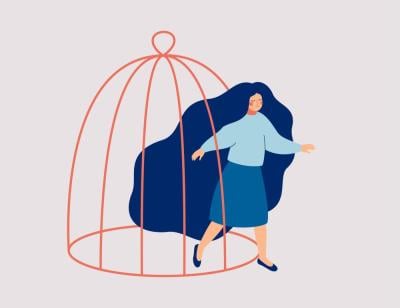Dysthymia Shouldn’t be a ‘Way of Life’: How the Low-Grade Depression is Diagnosed & Treated
Dysthymia Shouldn’t be a ‘Way of Life’: How the Low-Grade Depression is Diagnosed & Treated

For people who suffer from dysthymia, it often feels to them - and sometimes to their friends and loved ones - like it’s just who they are. Not that they are depressing, negative, glass-half-empty-thinking types but that something is not quite right with the way they consistently feel and it’s just how they have to live. Dysthymia, or dysthymic disorder, is a constant, low-grade depression that often goes under the radar. But according to Dr. Beth Salcedo, Medical Director of The Ross Center and former ADAA Board president, it doesn’t have to be a way of life. It is diagnosable and treatable.
In ADAA’s Patient Guide to Mood and Anxiety Disorders, a chapter on dysthymia relays how individuals with the disorder, a persistent though less intense type of depression, are often late to present to professional help. Despite an estimate of about 1 to 6 percent of the world’s population suffering from dysthymia, it is still a disorder that goes underdiagnosed.
In a conversation with ADAA, Dr. Salcedo explained more about the disorder and her experiences with those who have it.
Symptoms and Impact: The Cloud that Doesn’t Usually Clear On its Own
People don’t have devastating symptoms, says Dr. Salcedo, but rather, “they often glide through life with a sort of cloud over their heads.” While a well-known, sometimes overused analogy for depression, the cloud is apt and the idea of a “sort of” or “partial” shadow to describe dysthymia makes sense. In fact, it’s often more of a subtle cloud that follows the individual around, never seeming to clear or disappearing for only a brief period.
Typical symptoms of depression like changes in appetite, sleep, energy, self-esteem, and difficulty focusing occur with dysthymia but they may not impact the individual as severely as a condition like major depressive disorder (MDD). Dr. Salcedo notes that many people with dysthymia are able to function to a point that seems normal (to others in particular) but the issue does affect them.
“They might think, ok, I’m in pretty decent shape, I’m getting by, I still work, I get my kids to school, I sleep ok, etc.,” she told ADAA, “so they don’t seek treatment. But if you go deeper, you realize it is having an impact.”
Dr. Salcedo said an example of an impact could be that the person doesn’t pursue a graduate degree they wanted because they don’t have the energy for it, or they don’t get involved in a relationship because they don’t have the stamina to manage everything on their plate in addition to this potential new friend or significant other.
“Symptoms are milder but more persistent than major depression which can last several months and then remit. But dysthymia, while easy to write off and harder to detect, can make managing and coping more difficult as time goes on,” Dr. Salcedo said.
When Patients Present for Treatment
It’s usually at a time of crisis or when a person is faced with a major event, either negative or positive, in their life that someone might come into her office, Dr. Salcedo says. They’ve probably felt “off” for a while, she adds, but they don’t feel comfortable or content feeling that way. They know it’s not “just their personality” and they can remember a time when they didn’t feel this way.
Stigma can be a factor for why someone with dysthymia might avoid diagnosis and treatment, and people often think it will go away on its own. While that’s possible, says Dr. Salcedo, in her experience, dysthymia doesn’t typically remit as quickly as major depression and will likely not remit without treatment.
“People with dysthymia have symptoms every day for at least two years,” said Dr. Salcedo, stressing that it’s not normal to feel like that for that long and seeking treatment is important. “It’s not as well studied as MDD but like it, a lot of patients with dysthymia respond to therapy, medication and some lifestyle changes.”
Treatment Outcomes and Options for Living More Fully
In addition to therapy, such as Cognitive Behavioral Therapy (CBT), and medications like SSRIs or SNRIs, if needed, Dr. Salcedo says it’s good to look at one’s lifestyle and evaluate it. How will certain changes make you feel better? Reducing alcohol consumption, eating healthier, exercising more frequently (perhaps in a group or with others), and optimizing quantity or quality of sleep are all good choices.
“Some of these things can be put into place before or while seeking treatment,” Dr. Salcedo said, “especially if one has the wherewithal to do all that. It not, then obviously pursuing medication and / or therapy as soon as possible will help, so that the person can work on these other adjustments.”
People will start to feel better on medication and should stay on it at least a year if not more, she adds. She understands that a lot of people get on medication with the idea that they want to be off of it eventually so she works with them from the beginning, discussing tapering, if that’s their goal.
“But I encourage them to wait until they have lots of time in remission under their belt and they feel like they have the support systems they need to set them up for success,” Dr. Salcedo said, “There are options.” The option to get treatment and enjoy one’s life to the fullest should be a priority.




















